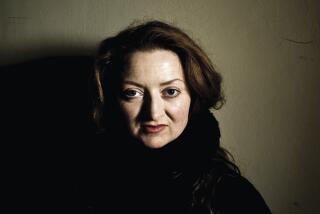Celebrating an anti-hero
Devotees and detractors of poet and novelist Charles Bukowski can agree on at least one thing: that he was a quintessentially Los Angeles writer. His gruff chronicling of the hard-knock life -- mostly his own, indirectly -- depicted the city in which he lived (for nearly all of his 73 years), loved (to put it gently) and drank (a lot).
Now the city has a chance to lay official claim to its local anti-hero by declaring a bungalow apartment Bukowski once rented a historic landmark. Memorializing the residence -- where, over a decade, the postal worker became a professional writer -- makes sense, even if it’s a contrarian way to remember a man whose gravestone reads “Don’t try.”
The city’s Cultural Heritage Commission, along with the City Council, will make a final decision on whether the site merits historic designation in about 60 days. The case seems to be a strong one. Bukowski wrote his first novel there and used it as the setting for another; he referred to the address in one poem (“5124 De Longpre Avenue/ somewhere between/ alcoholism and/ madness”); and mostly, he lived his hard life there.
Bukowski was -- despite the fame, the movie-star friends, the imitation of his life and style by would-be poets -- too brutally honest to be glamorous, a quality that gives much Los Angeles noir a slick sheen quite distinct from Bukowski’s grit. If noir subverted Los Angeles’ official narrative of sunshine, Bukowski subverted noir and gave the city’s image another, darker dimension.
It’s not easy to memorialize such a milieu. How does a city preserve its underbelly? And isn’t its preservation better accomplished in Bukowski’s well-read works? He mapped his Los Angeles in great detail, in fiction and life. His fans can list his many addresses. They know that the Central Library is where he was inspired to become a writer; that he turned his toil at the Terminal Annex Post Office into a novel; that he made bets at the Santa Anita racetrack, drank at Musso & Frank and died in San Pedro.
To pick one place to officially associate with the man would seem to limit his legacy. But it’s still a good way for his hometown to honor him. And Bukowski would certainly enjoy the irony. As he wrote in his poem “Crucifix in a Deathhand”:
real estaters, subdividers, landlords, freeway
engineers arguing. This is their land and
I walk on it, live on it a little while.
Now 5124 De Longpre, and the rest of Los Angeles, could be considered Bukowski’s land.
More to Read
Sign up for our Book Club newsletter
Get the latest news, events and more from the Los Angeles Times Book Club, and help us get L.A. reading and talking.
You may occasionally receive promotional content from the Los Angeles Times.






